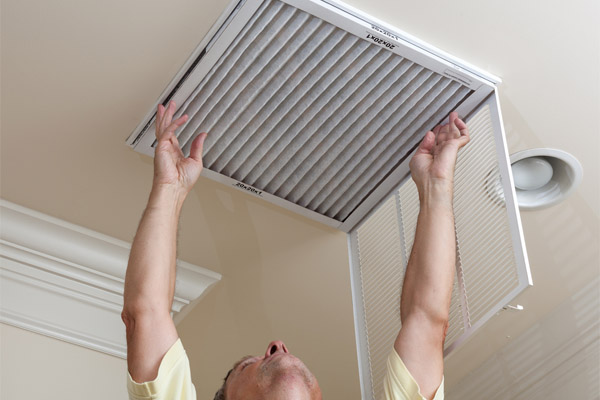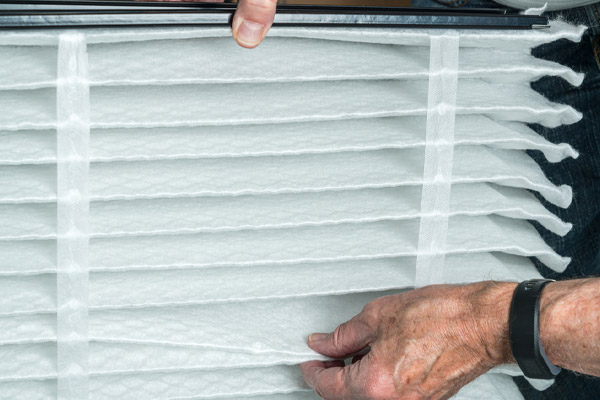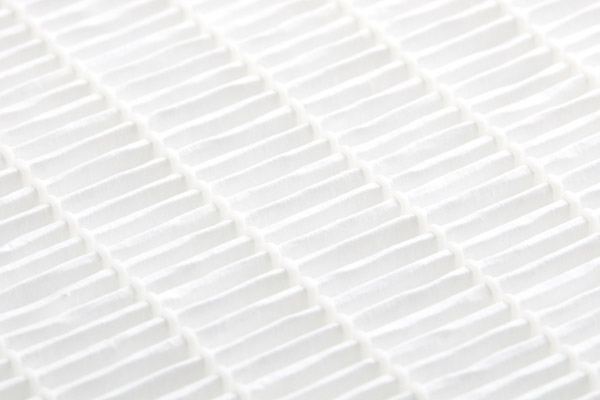Key Differences Between HEPA & MERV Filters

Air filters that work well can enhance the efficiency of HVAC systems and play a critical role in maintaining healthy air quality. By capturing particles such as dust, pollen, pet dander, and other pollutants, air filters prevent them from circulating throughout a building. Failure to remove these particles can lead to allergies, respiratory problems, and even damage to the HVAC equipment. HEPA and MERV filters are among the most effective air filters for HVAC systems. Today, we will explore the distinctions between HEPA vs MERV air filters.
HEPA Vs. MERV HVAC Air Filters: What You Need To Know
Contents
HEPA Filters
HEPA stands for High-Efficiency Particulate Air. It is an air filter that is proficient at capturing minuscule particles. HEPA filters function by utilizing both mechanical and electrostatic processes to trap pollutants. The filter media consists of a fine mesh of fibers randomly arranged to create a labyrinth of pathways through which air can flow. It also employs an electrostatic charge to attract and capture foreign particles.
HEPA filters are often employed in HVAC systems in critical environments such as hospitals, laboratories, and other places where air quality is critical. These filters are also used in homes and businesses to enhance indoor air quality, especially for individuals with allergies or respiratory problems.
To be categorized as a HEPA filter, the filter must be capable of trapping at least 99.97% of foreign particles that are 0.3 microns or larger. This makes HEPA filters incredibly effective at eliminating airborne pollutants, thus ensuring a safer environment for everyone.
Although HEPA filters are more expensive than other air filter types, they are very effective, making them one of the best filter options for your HVAC system. However, they have a shorter lifespan since they clog faster than other filter types.
Related Article: Top Reasons Your Air Conditioner Is Not Removing Humidity
MERV Filters

MERV stands for Minimum Efficiency Reporting Value. It is a measure used to evaluate the effectiveness of air filters. These filters, rated on the MERV scale, are employed in HVAC systems to eliminate common air pollutants in various settings, such as homes, businesses, and other locations concerned with air quality.
The MERV rating of a filter is based on its capacity to capture particles of different sizes, and MERV ratings vary from 1 to 16. Higher MERV ratings correspond to greater efficiency in capturing pollutants of varying sizes. Low-efficiency filters, ranging from MERV 1 to 4, remove large particles like dust and lint. Medium-efficiency filters, rated from MERV 5 to 8, can capture or trap smaller particles, such as mold spores and pet dander. High-efficiency filters, with MERV ratings from 9 to 12, can capture even smaller particles, such as bacteria and tobacco smoke. Ultra-high-efficiency filters, rated from MERV 13 to 16, can capture the tiniest particles, including viruses and combustion particles.
It is essential to note that while high MERV ratings imply more effective filtration, these filters can impede airflow, placing additional strain on HVAC systems. Reduced airflow means heating and cooling systems must work harder, potentially resulting in stress and expensive repairs, replacements, and maintenance. Filters with low MERV ratings do not pose such problems. Therefore, it is vital that you discuss which HVAC air filter option is best for your particular type of heating and cooling system.
Related Article: How Can UV Lights Improve Your HVAC System?
HEPA Filters Vs. MERV Filters

HEPA and MERV filters are widely recognized as effective air filters. However, they differ in several key areas:
- Efficiency: HEPA air filters are the most efficient filters as they capture more pollutants. While there are high-efficiency MERV filters, they do not meet the HEPA filter standards. If you need high indoor air quality, HEPA filters are the best choice.
- Particle Size: HEPA filters can capture tiny particles, as small as 0.3 microns, including bacteria, viruses, and smoke. MERV filters can also capture particles of different sizes, although not as small as HEPA filters. The greater the number of particles a filter can capture, the safer the space is.
- Cost and lifespan: HEPA filters are usually more expensive than MERV filters, and they have a shorter lifespan because they capture more particles, which causes them to clog up quickly. They may require regular maintenance and replacement, adding to the cost. MERV filters are more affordable and have a longer lifespan than HEPA air filters.
- Airflow restriction: MERV air filters with higher MERV ratings can effectively reduce airflow, while HEPA filters offer less airflow restriction. Restricted airflow can strain your HVAC system, which may require more maintenance.
- Usage: MERV filters are mainly used in homes and business establishments to address common air quality concerns. On the other hand, HEPA filters are used in critical settings such as hospitals and laboratories where air quality is crucial. They are also used in homes and buildings where people need better air quality due to allergies and respiratory issues.
Certain filters are created for particular purposes and are only compatible with specific HVAC systems. Selecting the ideal filter depends on your air quality needs and the type of HVAC system you own. Seek advice from a licensed HVAC technician and conduct thorough research to ensure you choose the appropriate filter that meets your requirements.
Related Article: How Does Your HVAC Affect Your Skin?
Conclusion
HEPA filters are better at capturing small particles than MERV filters but are also more costly and difficult to replace. Air filters play a crucial role in preserving indoor air quality by catching dust, dirt, and other particles and preventing mold and bacteria accumulation that can cause disagreeable odors and health issues. It is vital to consult with a knowledgeable HVAC technician to determine your requirements. They can assist you in making an informed choice when selecting the appropriate filter and air quality solutions for your residence.
Related Article: Signs You Need Better Air Quality At Home
Call Point Bay Fuel For All Of Your HVAC Requirements

At Point Bay Fuel, we pride ourselves on providing top-notch heating and cooling services throughout Ocean County and Monmouth County, New Jersey. Our team is made up of highly skilled and certified technicians specializing in HVAC tune-ups, repairs, installations, replacements, and more. Rest assured that when you choose us, you get expert service from knowledgeable professionals passionate about their work.
One thing that sets Point Bay Fuel apart from other HVAC service providers is our commitment to providing competitive pricing without sacrificing quality. Our maintenance services are designed to improve your home’s comfort, increase energy efficiency, and reduce heating and cooling costs. If you require an HVAC repair or replacement system, we’ll work with you to find the best solution for your home while keeping your budget in mind. We stand behind our work with a satisfaction guarantee, so you can trust that you’re in good hands with Point Bay Fuel.
Don’t hesitate to call us to schedule a service appointment or request an in-home estimate. At Point Bay Fuel, we are dedicated to providing exceptional service and keeping your home comfortable year-round.
Contact us now by calling (732) 349-5059 to speak to one of our home comfort specialists! Click the link to view our service area.
